Songs of loved ones past

Remembering family and friends through tidbits of memories
We’ll keep a welcome in the hillside
We’ll keep a welcome in the vales
This land you knew will still be singing
When you come home again to Wales
Bryn Terfel, “We’ll Keep A Welcome”
As a culture, we often freely associate those we have lost with cultural tokens: a song, a favourite food, a movie. The above song, for example, is performed by my grandparents’ favourite tenor. When I think of bananas, I think of when Taid (Welsh for Grandpa), at the end of breakfast every morning, would feed the last bit of his to the dog. Carving was one of his favourite hobbies, and his spinning chair was one of my favourite places to hang out in as a kid.
Point is, when a loved one dies, we cling to things. We grip onto the tidbits we remember most, and it is not always about the vacation trips taken, or the numerous times that particular person gave a motivational speech, or that one time where you had the best family reunion anyone could ever ask for. It might be the fact that your grandfather always had Werther’s Original candy in the cup holder of his car for you to snack on.
There is a reason that song selection is an integral part of funeral planning. The person’s favourite tune says a lot about them. A person who asks for “Stairway to Heaven” is likely different from the one who chooses “Highway to Hell.” More than that though, the cultural connections we make to a person after they are gone can also be linked to their material possessions. The seemingly endless mountain that so often accompanies a loved one’s passing.
Books are one notable example of this. A person’s library immortalizes them in a way that other items just don’t have the capacity to. What would my collection say about me? Probably, “John loved reading sports books, biographies, poetry, novels, and how-to books concerning literature. This is to say, John could not decide whether he was an English addict or an athlete and so settled on failed writer.”
There are, however, other cultural influences that make us remember those we have lost. Food is one example. After a loved one dies, we consistently, whenever eating that food, bring up that particular person. It’s like they are there enjoying that roast beef dinner with us. This inevitably brings with it the offshoot conversations of good times had. In short, that time, in that place, with those people. Things like food and music, then, are triggers. When someone lives for as long or as short as they do, we are unlikely to remember every little story, every detail. With the help of their favourites, however, their memory can be preserved.
As I write this, I am listening to a playlist of songs that remind me of those I have lost. Depressing, but important to their memory. Excuse me while I eat Werther’s and listen to Welsh tenors for the next few hours.









